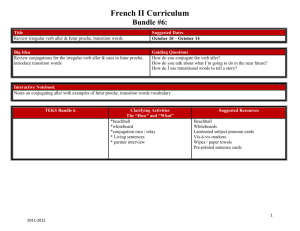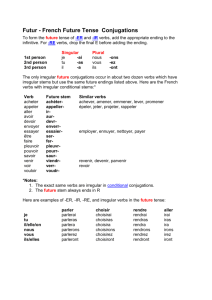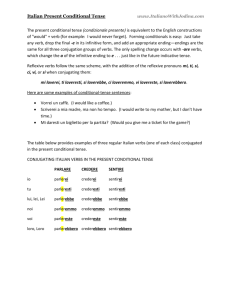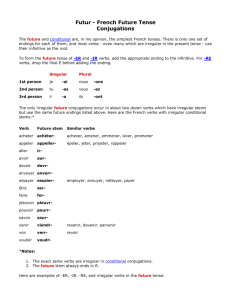Futur
advertisement
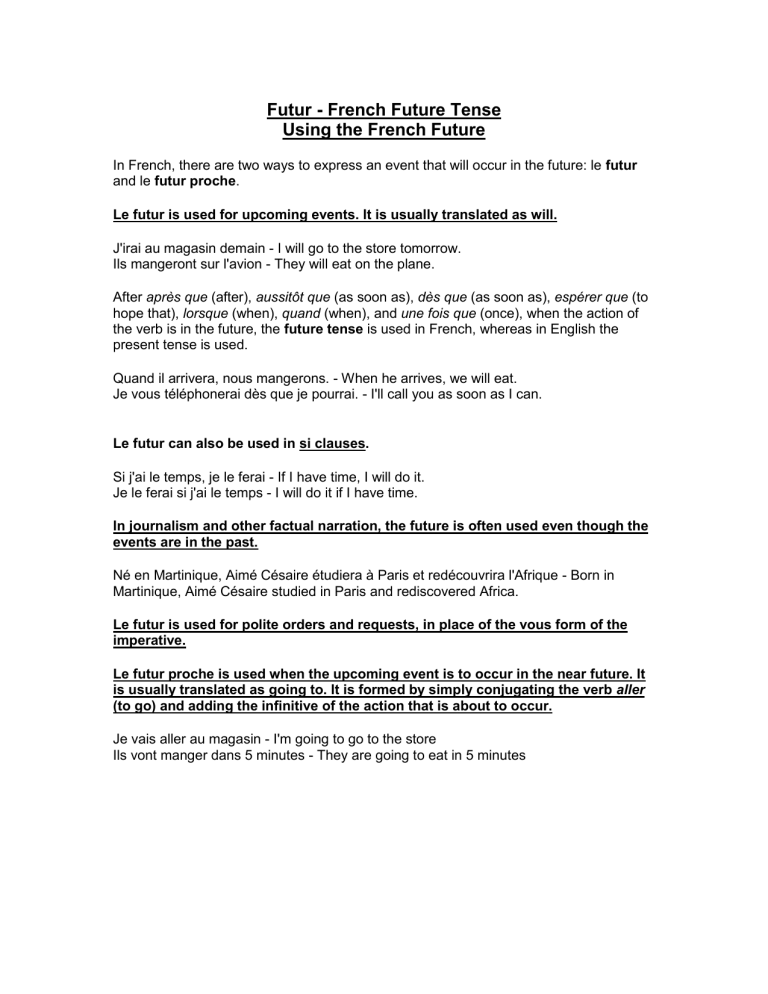
Futur - French Future Tense Using the French Future In French, there are two ways to express an event that will occur in the future: le futur and le futur proche. Le futur is used for upcoming events. It is usually translated as will. J'irai au magasin demain - I will go to the store tomorrow. Ils mangeront sur l'avion - They will eat on the plane. After après que (after), aussitôt que (as soon as), dès que (as soon as), espérer que (to hope that), lorsque (when), quand (when), and une fois que (once), when the action of the verb is in the future, the future tense is used in French, whereas in English the present tense is used. Quand il arrivera, nous mangerons. - When he arrives, we will eat. Je vous téléphonerai dès que je pourrai. - I'll call you as soon as I can. Le futur can also be used in si clauses. Si j'ai le temps, je le ferai - If I have time, I will do it. Je le ferai si j'ai le temps - I will do it if I have time. In journalism and other factual narration, the future is often used even though the events are in the past. Né en Martinique, Aimé Césaire étudiera à Paris et redécouvrira l'Afrique - Born in Martinique, Aimé Césaire studied in Paris and rediscovered Africa. Le futur is used for polite orders and requests, in place of the vous form of the imperative. Le futur proche is used when the upcoming event is to occur in the near future. It is usually translated as going to. It is formed by simply conjugating the verb aller (to go) and adding the infinitive of the action that is about to occur. Je vais aller au magasin - I'm going to go to the store Ils vont manger dans 5 minutes - They are going to eat in 5 minutes Le Futur proche - Near Future Definition A verb construction used to express something that is going to happen soon. Formation Present tense of aller + infinitive of action verb Examples Je vais voir Luc. Il va arriver. Nous allons manger. I'm going to see Luc. He's going to arrive. We're going to eat. The distinction between le futur and le futur proche is not always clear - there are many situations where you can use either one. Futur - French Future Tense Conjugations The future and conditional are the simplest French tenses. There is only one set of endings for each of them, and most verbs - even many which are irregular in the present tense - use their infinitive as the root. To form the future tense of -ER and -IR verbs, add the appropriate ending to the infinitive. For -RE verbs, drop the final E before adding the ending. Singular Plural 1st person je -ai nous -ons 2nd person tu -as vous -ez 3rd person il -a ils -ont The only irregular future conjugations occur in about two dozen verbs which have irregular stems but use the same future endings listed above. Here are the French verbs with irregular conditional stems:* Verb Future stem Similar verbs acheter achèter- achever, amener, emmener, lever, promener appeler appeller- épeler, jeter, projeter, rappeler aller ir- avoir aur- devoir devr- envoyer enverressayer essaierêtre ser- faire fer- employer, ennuyer, nettoyer, payer pleuvoir pleuvrpouvoir pourrsavoir saur- venir viendr- revenir, devenir, parvenir voir verr- revoir vouloir voudr- *Notes: 1. The exact same verbs are irregular in conditional conjugations. 2. The future stem always ends in R. Here are examples of -ER, -IR, -RE, and irregular verbs in the future tense: parler choisir rendre aller je parlerai choisirai rendrai irai tu parleras choisiras rendras iras il/elle/on parlera choisira rendra ira nous parlerons choisirons rendrons irons vous parlerez choisirez rendrez irez ils/elles parleront choisiront rendront iront Conditionnel - French Conditional Mood Using the Conditional The conditional is a verb mood used for events that are not guaranteed to occur; often they are dependent on certain conditions. It is translated as would in English. The French conditional is mainly used in si clauses: if ___ then ___. Il mangerait s'il avait faim - He would eat if he were hungry. Si nous étudiions, nous serions plus intelligents - If we studied, (then) we would be smarter. The verb vouloir is used in the conditional to express a polite request: Je voudrais une pomme - I would like an apple Je voudrais aller avec vous - I would like to go with you. The verb aimer is used to express a polite desire, sometimes one that cannot be fulfilled: J'aimerais bien le voir ! - I would really like to see it! J'aimerais y aller, mais je dois travailler - I would like to go, but I have to work. Conditionnel - French Conditional Mood Conjugations The future and conditional are the easiest French verb forms. There is only one set of endings for each of them, and most verbs - even many which are irregular in the present tense - use their infinitive as the root. To form the conditional of -ER and -IR verbs, add the appropriate ending to the infinitive. For -RE verbs, drop the final E before adding the ending. Singular Plural 1st person je -ais nous -ions 2nd person tu -ais vous -iez 3rd person il -ait ils -aient The only irregular conditional conjugations occur in about two dozen verbs which have irregular stems but use the same conditional endings listed above. Here are the French verbs with irregular conditional stems:* Verb Conditional stem Similarly-conjugated verbs acheter achèter- achever, amener, emmener, lever, promener appeler appeller- épeler, jeter, projeter, rappeler aller ir- avoir aur- devoir devr- envoyer enverressayer essaierêtre ser- faire fer- employer, ennuyer, nettoyer, payer pleuvoir pleuvrpouvoir pourrsavoir saur- venir viendr- revenir, devenir, parvenir voir verr- revoir vouloir voudr- *Notes: 1. The exact same verbs are irregular in future conjugations. 2. The conditional stem always ends in R. Here are examples of -ER, -IR, -RE, and irregular verbs in the conditional: parler choisir rendre aller je parlerais choisirais rendrais irais tu parlerais choisirais rendrais irais il/elle/on parlerait choisirait rendrait irait nous parlerions choisirions rendrions irions vous parleriez choisiriez rendriez iriez ils/elles parleraient choisiraient rendraient iraient

